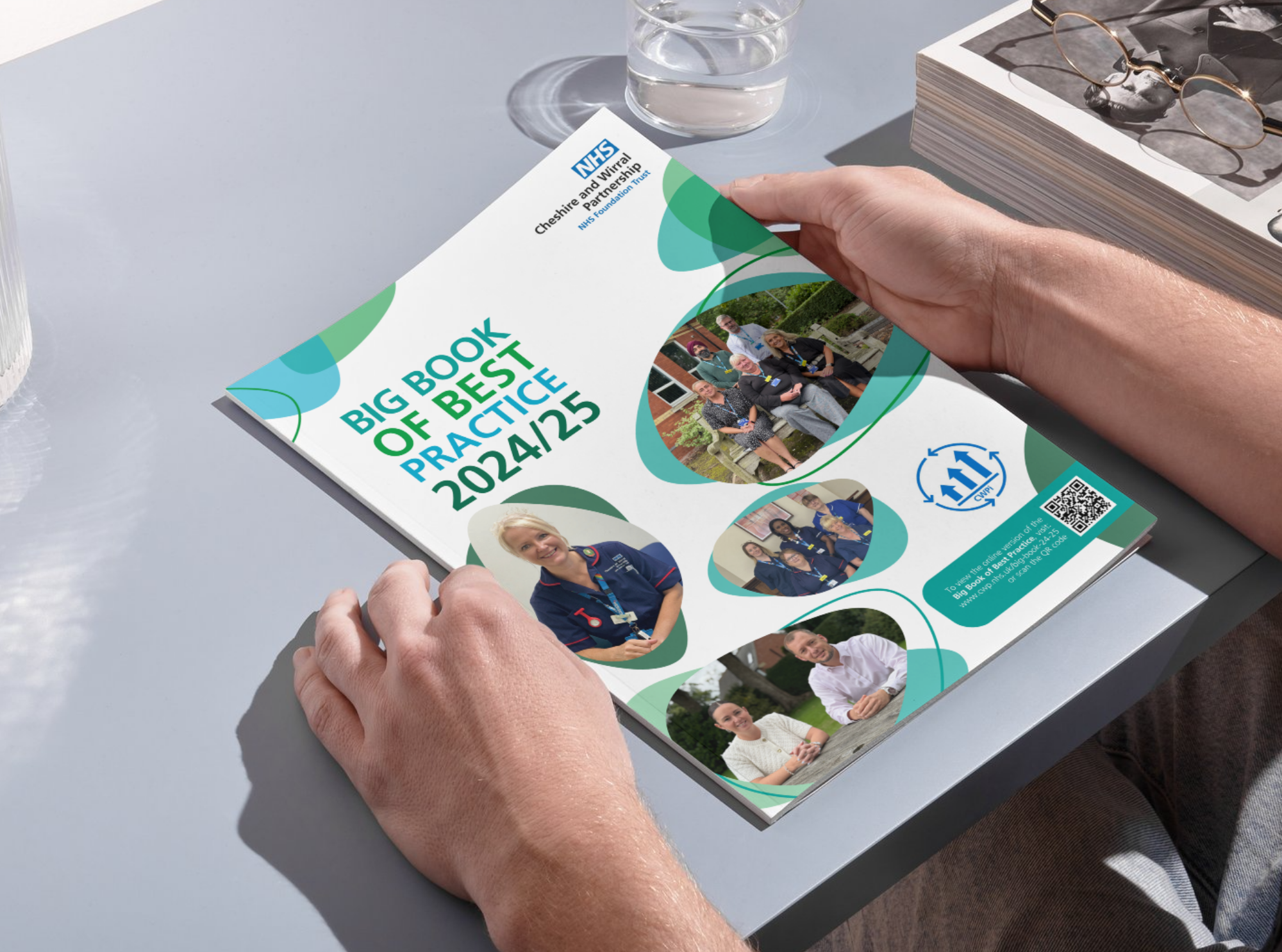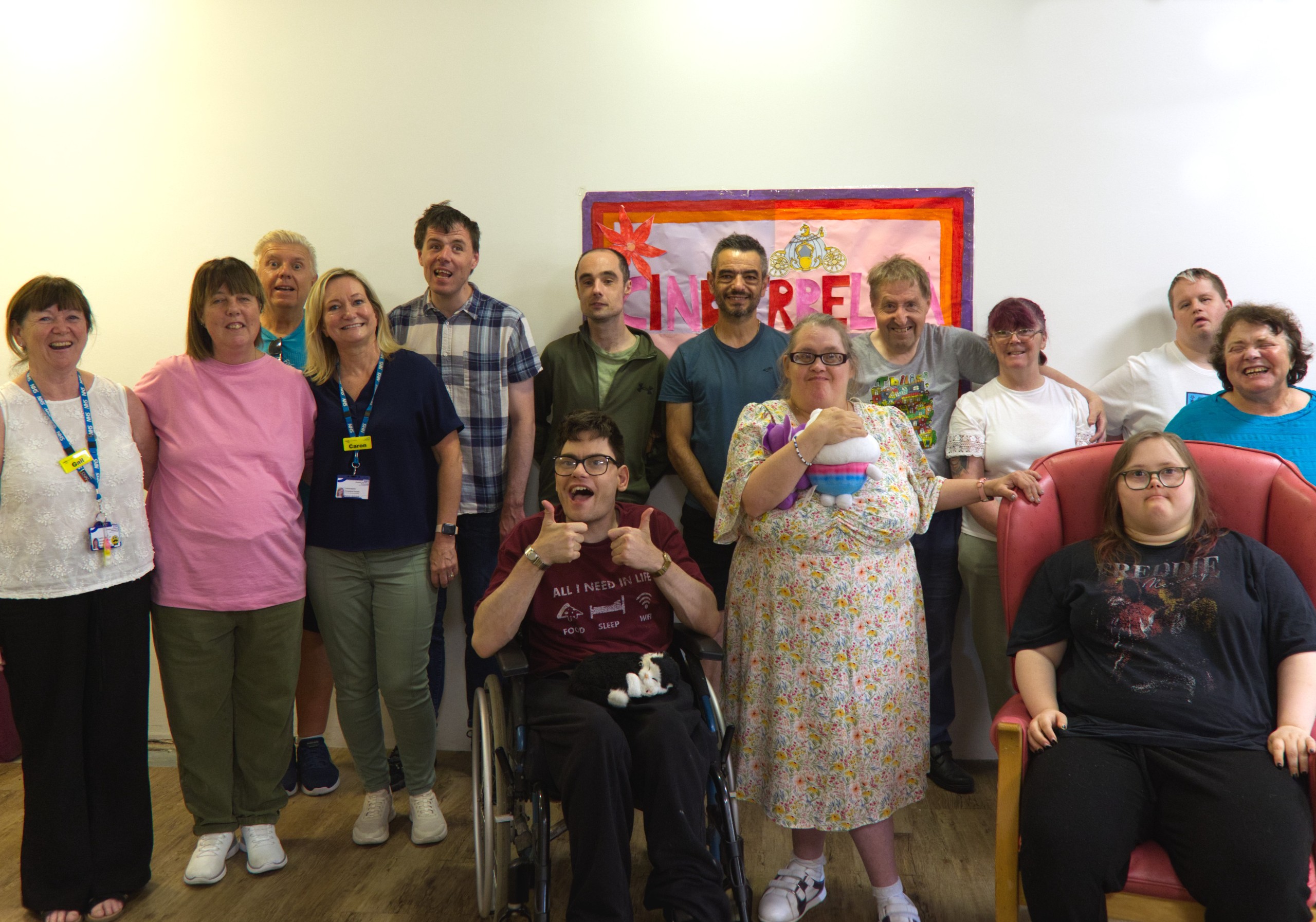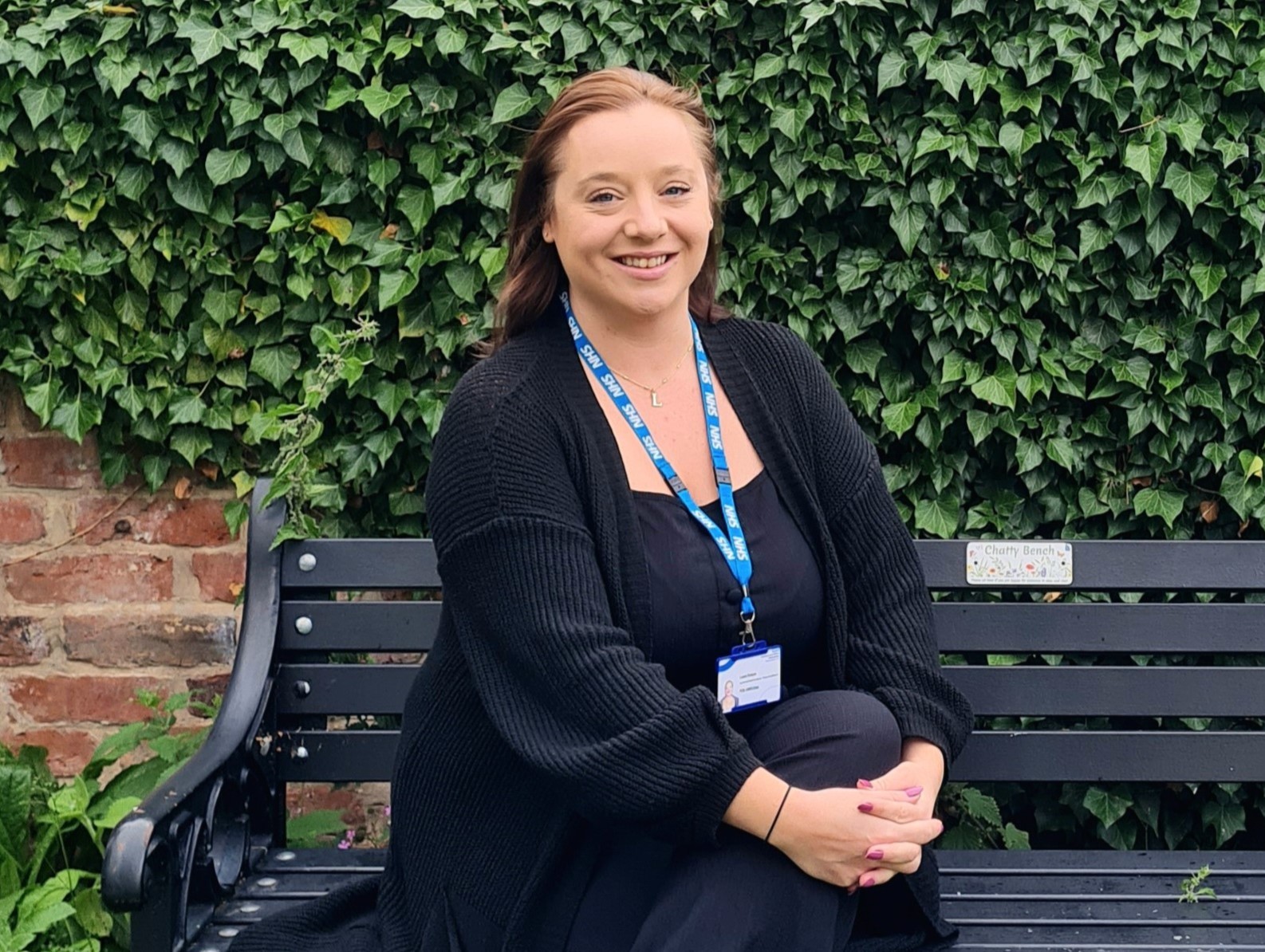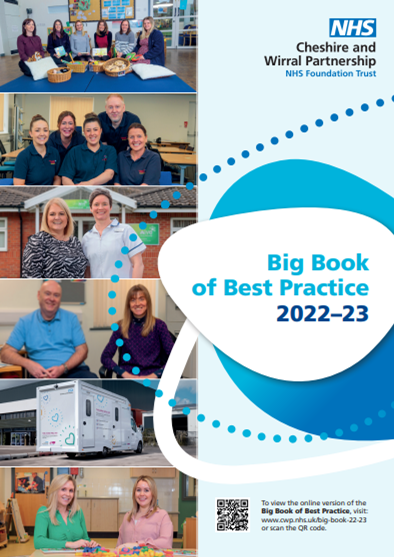Below you can view all the entries that made it into the Big Book of Best Practice 2024-25 from the specialist mental health and all age disability services care group.
Contact details for each project can be found within the entries below. For more information about the Big Book of Best Practice, email cwp.
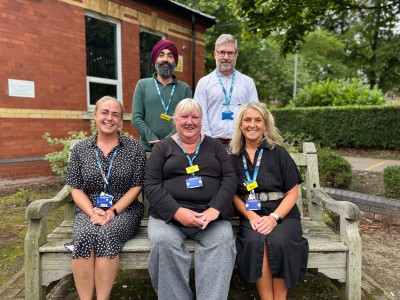
Contact: Sue.
What did we want to achieve?
It is estimated that for people with a serious mental illness, two in three deaths are from physical illnesses that can be prevented. Major causes of death in people with a serious mental illness include chronic physical medical conditions such as cardiovascular disease, respiratory disease, diabetes, and hypertension. This project aimed to reduce the health inequalities between people with a serious mental illness compared with those without. It also aimed to ensure physical health difficulties (unrelated to medication) are shared with the patient’s GP and that plans are in place to ensure these can be managed in primary care.
What we did
The team has taken a greater role in monitoring, managing and educating around physical health inequalities.
When someone is seen in clinic for depot administration or Clozapine monitoring, a cardio metabolic screening check is undertaken. Side effect screening is also undertaken at each contact.
Patients with a comorbidity undergo cardiometabolic screening prior to administration of their depot injection, and this has led to withholding of depots, directing to their GP or A&E, and each patient has received treatment.
The project has also been supporting people to access GPs without a bias toward mental illness.
Results
Additional screening has already picked up:
- two internal bleeds
- cancer
- referral to renal unit
- detection of deep vein thrombosis
- removal of polyps from the bowel
- several diagnoses of gastric reflux (including treatment)
Patients have responded very positively, with some stating that detection of issues may have prevented them from becoming seriously unwell.
Next steps
The next steps are to ensure all patients attending have this screening and appropriate interventions. The team will continue to advocate for patients in interactions with primary and secondary physical health services and provide education around interactions for their staff.
Another next step is to introduce a formal model of lowest dose to treat symptoms and review for reductions in medication regimes. The team would like to approach the ICT team about adding this to the clozapine side effects checklist, and possibly including the completed yearly physical health screening in the Management and Supervision Tool (MaST) data.
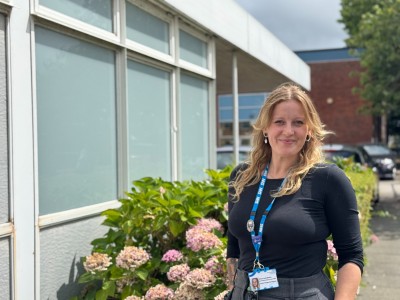
Contact: simone.
What did we want to achieve?
In May 2022, a CWP and Probation Service pilot commenced with funding from the Probation Service Initiative Fund. The service aimed to reduce health inequalities and access for those on probation with comorbid mental health problem, learning disability, substance or alcohol difficulties, and neurodiversity.
The service sought to support probation practitioners in working with complex people and navigating the barriers of mental health services for this demographic. The service covers Cheshire West and Cheshire East Probation Services. The service sought to offer flexible assessment approaches, so as to not discriminate based on dual diagnosis complexities.
What we did
- Advice or support for the referrer, including understanding a person’s diagnosis or treatment needs, linking them up with active services (multi-agency work), liaising with GP, and prison in-reach.
- Assessment of the individual’s mental health needs. Due to the complex nature of the individuals, this assessment can take place over a maximum of six sessions. This enables barriers to health to be broken down and to achieve the best outcomes for the individual.
- Information gathering to promote an interagency active safeguarding approach, particularly for those who move across geographical boundaries and live transient lifestyles.
Results
The service has accepted 521 referrals since the service opened for referrals on Monday 5 June 2023.
Of these referrals, individuals have been assessed and referred on to the most appropriate agencies to meet their presenting needs. This has reduced the burden on GP practices and mental health gateway services across the Trust, as individuals will receive a nurse-led assessment that meets their holistic and diverse needs to ensure there presenting complaints are captured effectively.
The service has also supported probation to adapt offence related work to ensure it is tailored to their induvial needs.
Next steps
There is a drive to continue to embed the service and secure long-term funding as the funding is limited to the next 12 months. The service hopes to present its work to date at various conferences across the patch to promote the work that has been completed. The service is the only one in the country and so there is scope to promote this service on a national scale to attract long term investment. The service will also seek to support a full-scale evaluation to assess efficacy and realistic ideals of rolling this service out in other Probation Delivery Units across the region.
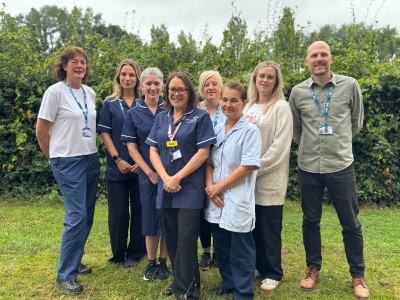
Contact: heidistubbs
What did we want to achieve?
The Older Adults’ Community Mental Health Team offered post-diagnostic sessions for people with dementia prior to the COVID-19 pandemic. They consisted of four two-hour sessions run over four weeks. It was a commitment for staff, carers and service users. During the pandemic, staff started to feel despondent about not being able to run groups and provide information and support for our service users with cognitive decline and their families. There was a need for post-diagnostic support.
What we did
The team consulted with the Alzheimer’s Society to devise a new programme to offer one session as part of the post-diagnostic support. They agreed an administration process with the team secretaries, who manage the referrals, invitations and team discharged following the group. The team now co-run the sessions with the Alzheimer’s Society.
Service users with a dementia diagnosis from the Memory Service can attend a support session with their families. The team include the dementia diagnosis and treatments, such as medication, wills and power of attorney, as well as personal care, staying well and keeping active.
The session covers how different lifestyle choices can affect the memory and the importance of keeping an everyday routine, how symptoms can worsen over time, with memory loss and confusion. The session covers the potential problems with language, understanding, and changes in behaviour. The programme covers how to access help and highlights the benefits of attending social activities and support within the community, which includes support for carers.
Results
A psychology student developed an evaluation form as part of her placement, so carers and service users have the chance to report their experience of attending the sessions. Staff see people leaving the group more relaxed and cheerful.
Feedback shows that people take away knowledge about their illnesses and where they can get help. They feel less isolated and empowered to maintain their physical health and live well with dementia. They leave with a positive outlook. The team members also feel a greater sense of fulfilment knowing they are providing meaningful support to people with dementia, during the critical post-diagnostic stage.
Next steps
The team plan to encourage other team members to co-run the group to increase their knowledge and gain experience. The evaluation forms are reviewed regularly so that they can be improved, and the sessions are adapted to meet the needs of the service users and their families. The team continue to review the information discussed and update it when necessary.
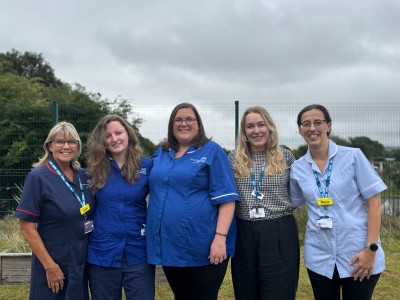
Contact: beth.
What did we want to achieve?
The main aim was to improve patient outcomes for individuals on clozapine. There is a lack of training and knowledge within physical health services and care providers on clozapine, which can result in missed doses and re-titrations - putting individuals at risk of relapse and deterioration of their mental health.
By putting together a fact sheet and cards for patients to carry around, it helps spread awareness of the drug and acts as a guidance template on what to do when a patient is under different services. This is especially relevant for service users in supported living or a care placement where there isn’t one person or next of kin who will liaise with professionals on their behalf. It supports better communication and knowledge.
What we did
The team introduced ‘clozapine cards’ for patients to carry around with them if they need to attend A&E to help aid communication, ensuring services are aware that they are on a drug that needs to be closely monitored and avoid missed doses and avoidable re-titrations.
Likewise, the team put together a clozapine fact sheet to give to care providers to help improve knowledge around the medication and to aid communication between care providers. It aims to improve health literacy and provide guidance on what to do in certain situations, aiming to improve patient outcomes.
This is relevant when urgent care and emergency services are called to care placements and the prescription of clozapine is identified early on in any assessment. Both interventions made were checked by the team pharmacist.
Next steps
The team’s plan for the future is to see this rolled out across trusts to ensure standardisation between services for service users across the Cheshire and Merseyside region and then reviewing its impact in the future to see if other monitoring teams for different medication may benefit from a similar approach.

Contact: emily.
What did we want to achieve?
The Specialist Perinatal Service wanted to ensure women referred to the service have access to timely psychology-based interventions, with choices around their care. They wanted to develop brief single-modality interventions that provide evidence-based skills-building and psychoeducation. They also wanted to ensure each of these interventions offer a normalising, trauma-informed, compassionate and perinatally-informed approach. They wanted to provide service-wide training to all staff to ensure understanding and skills in offering and signposting to each brief intervention. They then aimed to evaluate the efficacy of the brief interventions using routine outcome measures and service user feedback.
What we did
Brief intervention booklets were developed by psychological professionals and other staff in the Specialist Perinatal Service, alongside the service’s participation and engagement co-ordinators and experts by experience, ensuring the booklets were accessible and inclusive. Content of the booklets was led by key mental health needs in the perinatal period, using evidence-based NICE guidance. Interventions were delivered over six to eight sessions by assistant psychologists. Goals and routine outcome measures were gathered before and after the intervention to establish efficacy. Patient-reported Outcome and Experience Measure data was gathered at point of discharge from service.
Results
Twenty-seven complete data sets were analysed with pre and post measures for client-rated measure of psychological distress (CORE-10), Postpartum Bonding Questionnaire (PBQ), and goal based outcomes.
CORE-10 scores were seen to reduce reliably for all booklets. All scores dropped from the moderate-severe range to the low-to-mild range. The PBQ is a screening tool for understanding bond between the caregiver and baby. Higher scores indicate higher levels of difficulties within the relationship. All scores for the PBQ indicate a reduction in scores for attachment / bonding related difficulties as reported by the caregiver. Data shows a significant positive trend of client’s movement towards their desired goals with each of the booklets delivered.
Next steps
The service is planning to gather further data and compare efficacy of each of the booklets - such as from Mersey Care NHS Foundation Trust teams - and for this data to be shared across the service. They are currently developing further booklets, specifically around sleep in the perinatal period, and hope to evaluate this also. With sustainability in mind, they hope to transfer the booklets to an e-book format.
Team: Secure Services Occupational Therapy Team
Contact: kate.sharp3@nhs.net
What did we want to achieve?
The Secure Services Occupational Therapy Team wanted to develop the outdoor space on the low secure site at Soss Moss. The aim was to:
- provide improved access to nature for patients and staff
- increase opportunities for meaningful leave within the hospital grounds
- develop outdoor space that could be used in a therapeutic way
- link with CWP’s Green Plan Vision for 2022- 2025
What we did
The team submitted a funding bid to NHS England (NHSE) accessed through the Lead Provider Collaborative (LPC). After having the bid approved, CWP’s Grounds Team supported the team to plan a nature path through an overgrown and unused part of the site.
The team engaged with CWP’s Sustainability Officer and encouraged staff and patients to participate in planting 300 new trees around the path. They then identified the most appropriate places along the pathway to place seating, ensuring that these were well placed to give the feeling of being as immersed in nature as possible.
Results
The path is accessed by a wide variety of people, including patients, families, visitors and staff. A recent review of the impact has resulted in entirely positive feedback from all users. Feedback was gained verbally and in writing, and was collated into three main themes:
- Using the nature path helps all users feel more positive.
- Being immersed in nature helps patients to feel relaxed, calmer and free, away from the hospital setting.
- Staff access the outdoors much more now that there is an identified space, and report wellbeing benefits from this.
Feedback has included: “It takes me away from feeling like I’m in hospital.”
Next steps
The team has developed a patient woodwork group to build bird tables, bird feeders and bird boxes for around the nature path.
The team plan to extend this project further to include building natural signage and additional seating as well as provide general upkeep and maintenance. This will support patients to gain new skills, improve their self-esteem and gain a greater sense of belonging with the natural environment.
The team is also hoping to start a ‘mid-day mile’ initiative throughout the spring and summer months to encourage patients and staff to exercise together outdoors on a regular basis, improving their physical and mental wellbeing.
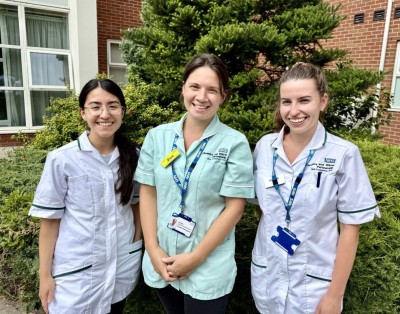
Contact: melissa.
What did we want to achieve?
The Bowmere Hospital Occupational Therapy (OT) Team wanted to develop a women’s group as part of the OT timetable for service users with acute mental illness. Occupational therapists (OTs) currently facilitate therapeutic activities to promote recovery during service users’ inpatient stay. Our therapeutic activities timetable already has a men’s group and service users had fed back that they wanted a women’s specific session. The aims of the women’s group are:
- to provide a safe space for women to empower and connect
- to gain knowledge around maintaining wellbeing and recovery in community
- to bring and share hobbies and skills from past and present roles
What we did
OTs and an OT technical instructor asked service users for session ideas to make it as collaborative and inclusive as possible. The team wrote up group protocols and researched evidenced-based resources, creating three different themes:
- Week 1: social interactions – promoting connection
- Week 2: roles and occupations - focused on changes for women over a lifespan
- Week 3: activities of daily living - sharing skills/hobbies and promoting activities that can be done both at hospital and at home
The team launched the women’s group in January 2025, as an hour-long session every fortnight.
Results
The women’s group has run regularly, with positive verbal feedback received from service users. The session welcomes anyone who identifies as a woman and is facilitated by female staff. The team gathered themes from questionnaires from December 2024 to March 2025. Service users appreciated:
- speaking with others being in a different environment
- using skills that they have not been able to do in hospital
- that they had learnt something new
Service users enjoyed talking about inspiring famous women and their roles. Staff have fed back that it has been a positive challenge to develop a new group.
Next steps
The team is planning to continue to include women’s group on the therapeutic timetable to run fortnightly. They are in the process of training all-female colleagues within the team to facilitate the group. The team would like to consider collaborating with female junior doctors or other colleagues, who can co-facilitate sessions focused on women’s health topics such as menopause and hormone interaction with mental health. They will share this with colleagues within Bowmere Hospital and wider CWP therapy colleagues.
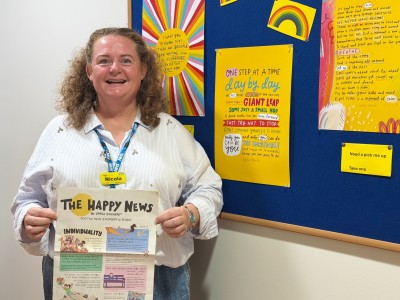
Contact: nicola.
What did we want to achieve?
Whenever a patient goes into a waiting room or reception area, they are often confronted with a TV screen with a large amount of information on or year-old newspapers.
The Adult Community Mental Health Team in Birkenhead wanted to create a more positive atmosphere and environment within their reception area at the Stein Centre.
The team wanted to stop the heightened state of anxiety, worry and distress that sometimes can happen while people are waiting for their appointment.
What we did
The team wanted the space to be positive and uplifting so they started to look at ways they could achieve this. Bringing in The Happy News newspaper was a start in this journey.
The Happy News is a platform to share only positive news and shines a light on everyday heroes. They provided a newspaper four times a year and offer a significant discount for the NHS and schools.
The team has ordered thirty copies which are placed in the reception area for people to read and take home if they wish. They have used other Happy News resources, such as colouring in sheets and postcards.
Results
The feedback from staff members, management, service users and other agencies has been fantastic.
The team spoke to a service user who was in the reception area reading the newspaper and advised that she could take it home. She explained that she carries a journal with her and when she becomes overwhelmed, she looks at the journal, and that she was going to cut out the news articles and put them into her journal.
Next steps
The team is continuing to receive the Happy News and use any free recourses available. They have some of the positive posters in the reception area and the clinical rooms to make them more inviting.
The team has shared this information with other participation and engagement workers and advised on the success of the project. They are hoping that other services feel inspired to have The Happy News newspaper in their own reception areas.
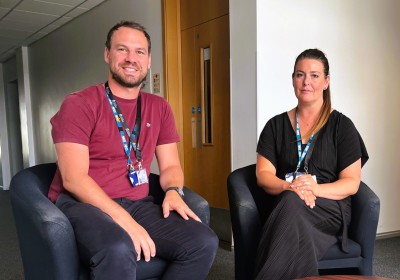
Contact: daniel.
What did we want to achieve?
The Harm Reduction Unit (HRU) stalking clinics were developed to provide structured opportunity and facilitate consultation between probation and HRU health professionals to inform ongoing risk management and management needs associated, identified, or suspected to be corelated to a stalking course of conduct. The consultations aimed to provide, if possible, a preliminary risk and psychological formulation which is specific to that case and will inform advice and recommendations pertaining to ongoing risk management plans. Recommendations may include an Initial Health Assessment (HIA) to determine whether an individual is viable for a bespoke therapeutic intervention.
What we did
From April 2023, the stalking clinic provided monthly face-to-face appointments at probation offices in the Cheshire footprint. This was reviewed in September 2023, and was moved on to an online forum from December 2023. This prompted a Microsoft Teams channel to be developed to create an integrated communication link between probation and HRU health colleagues. Within the Teams channel, an online booking system was created to support the organisation and facilitation of the stalking clinic. Probation would use the booking sheet to request stalking clinic appointments. The Stalking Clinic continues to operate online each month.
Results
From December 2023 - December 2024:
- 32 cases were heard
- 15 cases indicated that the perpetrator had behaviours consistent with stalking
- all cases received a brief risk and psychological formulation and discussions regarding risk management
- 50% of cases resulted in a full referral into the HRU
- five cases had a recommendation of an HIA
- two cases were viable for therapeutic intervention
Feedback included: “Advice was always given clearly, allowing for more in-depth understanding of the case, as well as more detailed risk assessment, which facilitated more accurate monitoring of the case and any possible increases in risk.”
Next steps
The audit highlighted the need to develop a data collection spreadsheet, so live data can be provided in a timelier manner. A feedback form will be developed to ensure that the users of the clinic can provide constructive feedback. HRU police colleagues will be invited to appointments to promote effective multi-agency working and a multi-professional case review with relevant information sharing. The clinic will continue to be a tool probation colleagues can utilise to discuss cases in a constructive environment to better understand risks and how to manage risk more effectively.

Contact: jill.
What did we want to achieve?
Cognitive stimulation therapy (CST) is recognised as best practice in dementia care. The ‘Making a Difference’ course is based on the principles of CST and offers group activities that support thinking, concentration and memory for individuals living with dementia. The Community Mental Health Team in Crewe, in partnership with the Involvement, Recovery and Wellness Centre (IRWC), have been facilitating these ‘Making a Difference’ groups since 2017 (including online during the pandemic). However, to remain committed to continuous improvement they actively listen to service user feedback and implement meaningful changes.
What we did
Feedback is collected after each eight-week course to ensure the programme remains person-centred. Some examples are:
- “It’s a brilliant group.”
- “Without groups like this I would have been struggling.”
- “I’ve enjoyed meeting with other carers.”
- “They’ve developed a voice and got their spark back.”
- “It’s helped my memory.”
- “I feel privileged to be part of the group.”
- “It’s given me the confidence to join other groups in the community.”
Results
In response to service user input, several improvements have already been made since the group’s induction, such as:
- establishing an introductory session for family members/carers explaining CST’s benefits
- creating a collaborative information sheet summarising each session to encourage ongoing discussion
- making suggestions for home activities after each session with guidance to take away.
- creating a follow-up session a few months after course completion.
- signposting to local community groups and dementia cafés to encourage be community confident.
These changes aim to enhance the experience and support for individuals with dementia, with ongoing improvements based on feedback.
Next steps
The goal is to continue collecting service user feedback and train further staff to facilitate CST moving forward. The aim is also to increase CST referrals and promote tools like the one-page profile for facilitators and group members. Moreover, they want to encourage carers and family members to connect during sessions. While some networking happens naturally, they hope to actively support this further by promoting meetups, like going for coffee together. This gives carers valuable time for themselves while strengthening their support network. The spring 2024 group still meets regularly.

Contact: olivia.
What did we want to achieve?
Patients on clozapine are at higher risk of infection, with an increased likelihood of pneumonia during the winter months. Contributing factors include cold homes, hypersalivation, respiratory comorbidities, and lifestyle habits such as smoking. In July 2019, the World Health Organization reported 6,893 cases of pneumonia in clozapine patients, with a mortality rate of 30%. A service development in Wirral was undertaken to identify clozapine patients most at risk of developing pneumonia during the winter and ensure they received a face-to-face consultation with a pharmacist to discuss suitable interventions and strategies for maintaining their health throughout the season.
What we did
The Trust’s clozapine business intelligence dashboard was used to identify patients under the Wirral Community Mental Health Team who had a home heating status rated ‘poor’ or ‘very poor’ (via Energy Performance Certificates) to create the patient cohort. Each patient was then reviewed to identify if they had further risk factors such as hypersalivation, respiratory co-morbidity, or smoking. A pharmacist drop-in session was scheduled alongside the clozapine clinics to allow for face-to-face consultations with minimal disruption to patient routine. Each patient was asked for consent prior to participating in the consultation.
Results
Nineteen patients have had appointments. Twelve patients consented to pharmacist consultation, and seven did not consent.
| Intervention completed | No. of patients |
|---|---|
| Smoking cessation counselling | 7 |
| Flu/COVID-19 vaccine counselling | 12 |
| Home heating reviewed/home thermometer given | 12 |
| Advice for staying warm in the winter | 12 |
| Hypersalivation review | 12* |
| Inhaler technique reviewed | 2 |
| Red flag symptoms of a chest infection discussed | 12 |
*Two hyoscine hydrobromide prescriptions written and three additional patients escalated to their consultant psychiatrist for hypersalivation review.
Alongside clozapine winter reviews, a further three prescriptions were written for laxatives and one patient’s psychotropic medication was amended to aid ongoing insomnia.
Next steps
Outcomes were distributed and discussed with the wider pharmacy team - in particular, the other CWP Community Mental Health Team pharmacists. The aim is to roll out the project across all Community Mental Health Teams within Cheshire and Wirral Partnership during winter 2025.
Team: Bed Based East Team Mulberry Ward
Contact: kate.
What did we want to achieve?
The Bed Based East Team on Mulberry Ward wanted to look at how they could continue to improve patient care and safety whilst supporting staff to understand their own safety climate and develop skills relating to safety measurement and monitoring. It was important that staff had the opportunity to reflect and build confidence.
What we did
The team requested to be part of the pilot for the Charles Vincent Dashboard (CVD) which allowed them the opportunity to work alongside the safer services to identify what was important to include and to focus on from a ward perspective. The Modern Matron, Head of Safe Services, and Safety Lead met with the Mulberry Team to ascertain what they felt was important to include, and from this, an initial focus was placed on aspects which included deep vein thrombosis and falls assessments and completion of Health of Nation Outcome Scales (HoNOS).
Once the CVD was up and running, the team had opportunity to have weekly follow-up sessions which enabled them to add in more areas. The leadership team on the ward met with staff and shared the CVD and how this could impact positively on patient care and safety. This also allowed ward staff to identify how the dashboard could be further improved. Following the pilot, the CVD has since been rolled out on the other three wards in the locality.
Results
There have been a number of benefits since commencing the CVD. It has helped to build on staff confidence around patient safety and an understanding of how data can improve safety. It has reduced the burden of manual audits as the data is there to see instantly, helps to keep things focused, and sets a visual target for the team.
The CVD supports the team to identify learning and areas for development. Completion rates of HoNOS, deep vein thrombosis and falls assessments increased significantly once staff had an increased understanding. It also gives assurances around patient safety and allows for regular monitoring to provide positive feedback for the team.
It has enabled the team to focus on improving processes and systems. The ward manager was able to look at the carer contact recording process and included ward clerks to record carer contacts to ensure that the ward was as responsive as possible.
Next steps
The CVD is individualised to each ward’s specific needs. As a ward, they are continually looking to further improve patient care and safety processes, and the CVD allows them to identify further aspects where the focus can be on improving outcomes and capturing patient and carer experience.
There have been further discussions with the ward about different ways to capture and record feedback from patients and carers.
Mulberry Ward has been involved with sharing the outcomes of CVD with Safe Services, Integrated Care Boards, the Quality Committee and the Low Secure Services Commissioners Prospect. The ward has also completed a video that was shared with other North West NHS trusts.
Team: Workforce Development Hub
Contact: rachel.
What did we want to achieve?
The project aimed to strengthen the recruitment, wellbeing and professional development of the Cheshire and Merseyside NHS Talking Therapies workforce. The workforce consists of both clinical and administrative roles across 10 services. During the initial stages of the service’s development, there was clear focus on supervision delivery. Through stakeholder consultation, it was agreed that the service would expand its remit to incorporate workforce development and retention workstreams. This process was achieved by incorporating new roles into the service.
What we did
All activities were developed in collaboration with external clinical/service leads and supervisors. Hub team members hosted various forums to share best practice and develop initiatives. The workforce provided Step 2 and Step 3 supervision, hosted supervision community of practice meetings, hosted a centralised recruitment process, and developed a senior psychological wellbeing practitioner (PWP) forum. The team also offered continuing professional development (CPD) opportunities including risk training, supervision training, compassionate leadership training with peer network meetings, and two eye movement desensitisation and reprocessing (EMDR) workshops. The team hosted a planning group meeting for staff wellbeing champions. Group activities included an away day, plus reading and walking challenges (Steptember).
Results
All hub activities are evaluated by surveys. Quarterly newsletters showcase good news stories from across the services. The centralised recruitment process recruited 41 trainee PWPs and 31 trainee high intensity therapists (HITs).
There were 191 attendees at the virtual open day events. One candidate said: “Great idea to have a pre-application webinar - very informative”.
480 staff members attended the CPD sessions. One of EMDR workshops was rated five out of five, and one attendee said: “This training was helpful, engaging and encouraging”.
148 staff members took part in the Steptember challenge, where an incredible 38,644,381 steps were taken during the month of September.
Next steps
As of December 2024, the Workforce Development Hub has delivered 20,757 hours of supervision. The hub will continue to deliver a high-quality supervision provision in 25/26. The next steps will include:
- extending the centralised recruitment process to include in-person recruitment events
- hosting the first Cheshire and Merseyside NHS Talking Therapies Staff Health and Wellbeing Festival
- tailoring the CPD offer based on need to include workshops on burnout, bereavement and a session specifically designed for counsellors, offering attendees accredited CPD points
- piloting a PWP preceptorship
- developing meta-supervision guidance, training and research
Team: Alderley Unit
Contact: emma.
What did we want to achieve?
- An anti-racism project, easily accessible, easy to understand and clearly demonstrates the goals and expectations as a service.
- For CWP and Cheshire Police to work collaboratively to enhance patient and staff wellbeing and safety on the ward and in the community.
- To develop a positive, trusting relationship between patients and the police.
- To reduce racial abuse incidents on the ward and therefore demand on police time.
- To develop patients’ understanding of the impact of crimes on the victim and wider community.
- To encourage a reflective approach to incidents on the ward and in the community.
- To make staff feel supported within their role and know racial abuse is taken seriously.
What we did
The slides have been simplified to meet the needs of Alderley Unit patients, but the team will also allow for further adaptations depending on the patient's needs on the day.
Comic strip conversations have been used as they are a visual way to help explore a young person’s thoughts and feelings about a situation.
Patients will be shown three videos (produced by the police) around abusive and racist language, domestic violence, and misogyny.
The videos will have a positive approach giving ideas of what patients could do in situations and the impact on the victim rather than focusing on the crime itself.
Results
The project has only just started but plans to measure its effectiveness include:
- Baseline questionnaire before intervention to establish patients understanding of hate crimes and the impact on other, views of the police.
- Continue to track incidents (via Datix) on the ward and review monthly.
- Track the way each incident is managed, eg managed on the ward, police action.
- Re-visit the questionnaire three months after initial session.
Next steps
To put the project into place, work with the individuals on the Alderley Unit and hopefully over time will see a decrease in racial and physical abuse cases being reported to Cheshire Police. Hopefully this project will instil some confidence in the staff teams to make them feel that their voice is being heard, they are valued members of staff and as a Trust, we are taking this matter seriously.
Once in place the team can hopefully roll the project out to other wards, in particular patients with autism and a learning disability.
Team: Secure Services Team
Contact: rebecca.
What did we want to achieve?
Service users within low secure services have come into contact with criminal justice systems usually linked to harming others but also have significant vulnerabilities themselves - both of which can relate to technology.
Individuals frequently experience restrictive access to internet-enabled devices. Some can spend long periods of time in secure settings, impacting upon their functional and relational skills. Additional vulnerabilities extend when the person works towards community life when restrictions reduce, and independence develops. The project aimed to co-produce an internet safety programme with service users, adapted to individuals’ mental health needs and neurodiversity, risk histories, legal frameworks and future life aspirations.
What we did
The team and service users developed a seven-session internet safety course. This initially was developed for and co-produced with individual service users and then enhanced further within a clinical group setting. Different multi-disciplinary team members worked together to review and adapt the sessions based upon monitoring and feedback from participants, facilitators and stakeholders (such as easy read options, pictorial information and videos, role plays, games and quizzes to assess learning and understanding).
The seven sessions included:
- Introduction to the internet
- Social media
- Communication
- Vulnerability
- Offending
- The algorithm
- Money and scams
- Managing mental wellbeing and recap
Results
Service users within secure services were offered the opportunity to access the programme which was fully adapted to the person’s individual needs. The clinical team utilised feedback/outcome data from sessions to develop risk management plans and underpin clinical risk decision making.
As part of the CANDDID Conference for autism, neurodevelopmental disorders and intellectual disabilities (March 2024), the team produced a video outlining the internet safety intervention. The video shared elements of the intervention with a larger group of service users, parents/carers, and professionals - enhancing access for those vulnerable to risk and offending on the internet and supporting signposting to helpful resources.
Next steps
The team are supporting other forensic services through presentations/liaison to utilise the programme and diversity options for a wider group of service users. The development of the programme continues using an iterative approach, with one service user currently finalising a further review of the content with updates around changes in the law and technology, such as the role of artificial intelligence in offences (March 2025).
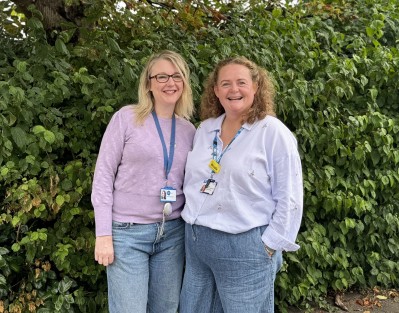
Contact: nicola.
What did we want to achieve?
The Adult Community Mental Health Team in Birkenhead wanted to improve accessibility to free, impartial and confidential advice for the community mental health service users. This is extremely important for service users who do not have access to the internet, phone or computers. Seeking support early for an issue can reduce the heighten stated of anxiety, worry and distress.
What we did
The team engaged with Citizens Advice Wirral to install a terminal (laptop) at the Stein Centre reception area.
The terminal is available during the Stein Centre opening times. Citizens Advice Wirral attends the Stein Centre to check the terminal is working every month.
It allows service users to find advice, email citizens advice for advice and request a call back from Citizens Advice Wirral.
Results
Citizens Advice Wirral gives the team a monthly report to inform them on how many people have accessed the terminal.
Since September 2025 to January 2025, 100 service users have used the advice terminal and the team are hoping the numbers will grow.
Next steps
The team is continuing to work with Citizens Advice Wirral to deliver training to staff members. This includes:
- understanding the role of an Advice First Aider (like a physical first aider - confident to assess a situation and find the right solution, not resolve directly)
- finding appropriate information on the Citizens Advice Website
- a section using the website to navigate through someone's welfare issue
- identifying when and how clients should be referred into Citizens Advice Wirral
- identifying how and when to signpost to other organisations
Team: Adults’ and Older People’s Community Mental Health Team - Crewe
Contact: laura.
What did we want to achieve?
This project aims to make the resource centre inclusive and accessible for people who require reasonable adjustments when they are attending services in the building. The space includes various seating options, altered light patterns, weighted blankets, and fidget toys.
The team has bubble tubes and ear defenders to support an individual’s relaxation and cater for sensory needs on request. The aim is to prevent overload from a high stimulus environment, which can be a barrier to people attending appointments. This space can be used as a consistent meeting space for interventions or for anyone who needs to wait in reception.
What we did
Following consultation with service users, staff experts, and a discussion with an autism ambassador group, the team identified the most appropriate space in the building that would offer the most accessibility for usage by a range of services in the centre.
Working with procurement to source Trust-approved providers, the team chose the required items of furniture to soften the environment, without compromising clinical standards.
The team also hung a mood wheel which had been provided kindly by a service user, to be helpful and supportive to others. They felt this was an important item to be displayed in the room.
Results
The team is now able to offer alternative space appropriate for adults if service users or carers become unsettled or distressed whilst waiting in the reception area. They also can offer the space for consultations with clinicians, allowing service users to feel comfortable and supported whilst accessing care. This room can also be used for staff to support wellbeing and mental health. This is now regularly requested for use and feedback has been positive, with compliments received by the service.
Next steps
The team will be continuing to develop this space, listening to feedback and up-to-date research and developments. They discussed this project within management forums, and this has also been rolled out in other centres.
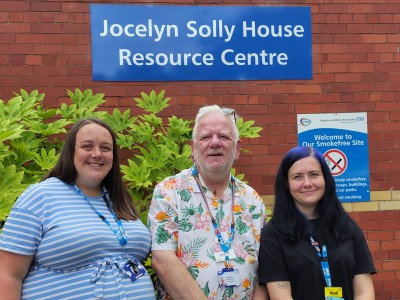
Contact: cwp.peersupport@nhs.net
What did we want to achieve?
The peer support project set out to create an environment, initially within community teams, that is conducive to integrating peer support into services, either by volunteers with lived experience of mental health problems, or by employing peer support workers (PSW). At the core of peer support is the value placed on lived experience of mental health difficulties, seeing this as a form of expertise.
Peer support aims to build personal, social and community connections - drawing directly on lived experience, and offering emotional and practical mutual support to others going through a similar experience. It is non-directive and recovery focused.
What we did
With the recruitment of a project manager, the peer support pathway was co-produced, including clear progression opportunities - from trainee, to volunteer, to paid roles.
Learning from existing peer support models, the teams ensured they rolled out a consistent model of peer support, made links with CWP teams and services, supported teams to develop their understanding of the value and role of peer support, implemented peer support roles in several teams, ensured access to appropriate levels of peer support training and provided peer-led support. The project piloted creative approaches to the recruitment of people with lived experience for peer support roles.
Results
CWP now employs 16 PSWs across six teams and has 23 recovery support (peer) volunteers. These quotes from staff and patients show some of the principles of peer support in action:
- “I’ve never felt judged by my PSW, or that she assumed anything. She only responds to the things I tell her as opposed to anything that might be on my file about a previous diagnosis.”
- “Good use of self-disclosure allows people to feel less isolated by their experiences.”
- “Sharing their own experience of the system to engage someone who has previously taken some time to trust practitioners.”
Next steps
Aligning the current approach to peer support development with the three pillars of safety, effectiveness and experience, provides a framework for how peer support underpins CWP’s drive for quality.
Building on current practice next year will include:
- piloting wellness action plans with peer workers or volunteers as part of maintaining wellbeing and psychological safety
- providing a strong framework for evaluating outcomes or addressing variations in role impact
- expanding the focus on gathering and acting on feedback regarding peer interactions, which could further solidify its contribution to experience and effectiveness pillars
Honorable mentions
With nearly 100 entries received for the Big Book of Best Practice 2024-25, we have unfortunately been unable to include every entry in the final book. However, many of the projects – despite not being selected for full publication – deserve to be celebrated for the fantastic outcomes achieved.
You can view the honorable mention for the specialist mental health and all age disability services care group below:
-
My story - Alderley Low Secure Unit
-
Emergency food and fuel support - Adult Community Mental Health Team Birkenhead
-
Improved quality of life - Mulberry Ward
-
Our first Bowmere art exhibition - Bowmere Hospital Occupational Therapy Team
-
The implementation and growth of specialist speech and language therapy provision within CWP’s acute inpatient mental health services - Specialist Speech and Language Therapy (Cheshire East Acute Services)
-
Supporting and training supported accommodation providers - Mental Health Intensive Support Team (Community Mental Health Rehabilitation)
